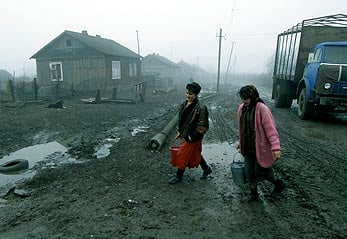UNHCR concerned about gas cuts in Ingushetia's settlements
UNHCR concerned about gas cuts in Ingushetia's settlements

GENEVA, Feb 20 (UNHCR) - The UN refugee agency has raised concerns over recent utilities cuts in Ingushetia's temporary settlements that have left more than 2,000 displaced Chechens in the bitter winter cold.
Since February 13, UNHCR staff and their partners in non-governmental organisations (NGOs) have confirmed gas cuts in 10 temporary settlements housing over 2,000 Chechens in Ingushetia. Many of the cuts were to rooms recently rehabilitated by international NGOs as alternative shelter for Chechens living in tented camps threatened with closure.
There have also been reports of threats to disconnect water and electricity supplies. This, despite repeated assurances by the Ingush authorities that internally displaced persons (IDPs) would not suffer cuts in basic utility services while enjoying the hospitality of Ingushetia.
"UNHCR believes that whatever the pretext, it is unacceptable to cut utilities - particularly heating gas - in mid-winter," said the agency's spokesman Kris Janowski at a news briefing in Geneva Friday. "These unfortunate utility cuts exert pressure on the IDPs to go back to Chechnya, and bring into question the voluntary nature of the return."
He added that recent developments in the temporary settlements, together with the ongoing closure of Bart tented camp, "deprive IDPs of a genuine option for safe haven in Ingushetia," where more than 65,000 Chechens have registered for assistance in three tented camps, temporary settlements and private accommodation.
Attempts to pressure Chechens into going home have been criticised by the Russian President's Human Rights Commission, noted Janowski. After visiting Ingushetia at the end of January, the commission recommended that no deadlines by imposed on the return to Chechnya, and that inviting the IDPs to go back would be premature.
The refugee agency spokesman said that UNHCR and other UN agencies are currently working with the authorities at both the federal and local levels to resolve the situation as soon as possible.








